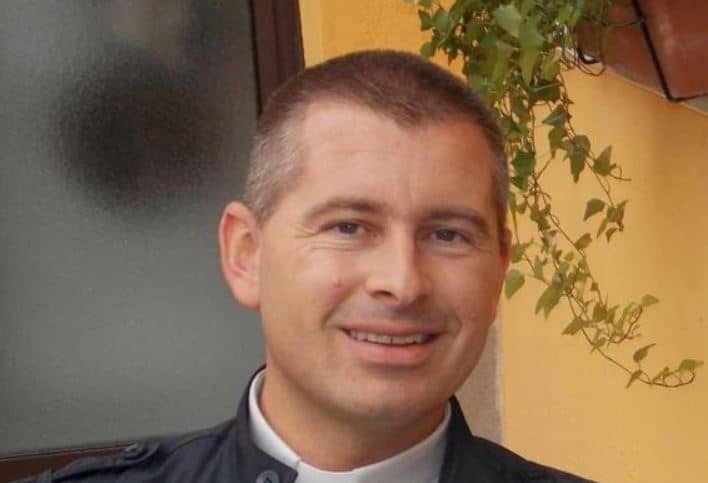ROME – Twelve immigrant farmworkers died after a car crash Monday in Southern Italy, highlighting the unsafe working conditions of many foreigners living in the country and provoking an outcry from the local Church.
“These kids cannot live in hovels like mice,” said Cardinal Gualtiero Bassetti of Perugia, head of the Italian bishops’ conference, in a statement Aug. 7.
On the afternoon of Aug. 6, on a highway between the southern Italian towns of Foggia and Termoli, a van carrying immigrant farmworkers returning from a hard day’s work picking tomatoes in a field crashed against a large truck.
According to investigations, the driver of the truck lost control of the vehicle and smashed into the van carrying the 12 farmworkers, which flipped several times. All of the passengers were originally from Africa, and seven have been confirmed to have been legally residing in Italy, probably in the infamous Rignano Ghetto, home to over 500 foreigners.
Three others were wounded in the accident, including the driver of the truck.
Just last Saturday, again in southern Italy, another deadly accident claimed the lives of four migrant farmworkers, with four others severely wounded.
Foggia, 12 braccianti africani morti in un incidente. Rientravano dal lavoro https://t.co/YL8dBc3Dyk pic.twitter.com/QVbNJonH8q
— IlSole24ORE (@sole24ore) August 6, 2018
“In the name of the Italian Church, I express my dismay before the 16 young Africans who have been victims these past two days of accidents in vans with no brakes and no guarantees, and my indignation for the inhuman conditions in which they live,” Bassetti said.
The two cases so close to one another have shed light on the unsafe working conditions of many immigrants residing in Italy, and the widespread illegal recruitment of agricultural workers for very low wages and virtually no safety precautions.
“I will ask for thorough controls to fight, in all of Italy, exploitation and illegal employment,” said Minister of the Interior Matteo Salvini, who, as head of the populist right-wing party Northern League, has often made use of anti-immigrant rhetoric.
“[Let’s say] a prayer for the victims and their families,” he added, speaking to local reporters.
Amidst a climate of rising tension over immigration, the Church in Italy has shown that it will not be silenced. Several Catholic publications recently condemned the episodes of racism and xenophobia that immigrants face on the peninsula and criticized the newly elected populist government for fanning the flames.
“All [of these immigrant workers] were underpaid, many off-the-books,” Bassetti said. “All [were] young people who, despite being paid so little, sent their savings to their families in Africa, because there they are even poorer.”
On Aug. 8, several farmworkers marched in the city of Foggia calling for workers’ rights and dignity as well as protection from those who profit from illegal work. The march was organized by the Italian workers’ unions but also by many non-profit organizations, both secular and Catholic.
The march also made a stop at the Rignano Ghetto, a large assortment of mobile homes, sheds and broken tires, where many of the immigrant victims lived. The Italian branch of Caritas, the global federation of Catholic charities, has been very active in this ghetto offering alternative options of employment that help many immigrants escape the trappings, and dangers, of illegal work.
“It’s my duty to be here,” said Bishop Giovanni Checchinato of San Severo, who took part in the marches, “because the Church feels as its own the suffering of these brothers and can’t not condemn the dramatic conditions in which they live and die.”
The local bishops have shown solidarity with the victims. The Archbishop of Foggia-Bovino, Vencenzo Pelvi, has been actively involved in ministering to the ghetto and its inhabitants. Following the accident, he wrote a message for diocesan communities inviting them to dialogue with ‘the other’ and to avoid prejudice in the name of a “higher justice.”
The archbishop also celebrated a Mass in the cathedral in Foggia to commemorate the young men who lost their lives Saturday. He later visited the hospital where two of the immigrants wounded in the crash were being looked after in order to offer support and closeness.
“There cannot be ‘tier A’ people and ‘tier B’ people,” said Pelvi in an interview with Vatican Radio.
“I was struck by seeing the solitude of the young wounded men who I visited in the hospital, they didn’t have anyone close to them in this moment of suffering,” he said. “I believe that the case of this car accident should help us reawaken a sense of solidarity, tenderness and care.”

















